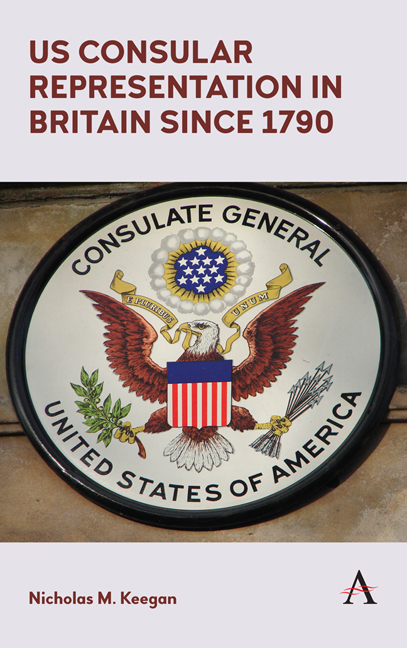Book contents
- Frontmatter
- Dedication
- Contents
- List of Illustrations
- Foreword
- Preface
- Acknowledgements
- Introduction
- PART 1
- Chapter One Early Colonial History and American Independence
- Chapter Two Creation and Growth of the State Department
- Chapter Three Establishment and Development of the Consular Service
- PART 2
- PART 3
- Appendix: Locations and Categories of Consular Offices
- Notes
- Sources
- Bibliography
- Index
Chapter Three - Establishment and Development of the Consular Service
from PART 1
Published online by Cambridge University Press: 21 June 2018
- Frontmatter
- Dedication
- Contents
- List of Illustrations
- Foreword
- Preface
- Acknowledgements
- Introduction
- PART 1
- Chapter One Early Colonial History and American Independence
- Chapter Two Creation and Growth of the State Department
- Chapter Three Establishment and Development of the Consular Service
- PART 2
- PART 3
- Appendix: Locations and Categories of Consular Offices
- Notes
- Sources
- Bibliography
- Index
Summary
The first American consul, as opposed to commercial agent, was Colonel William Palfrey, appointed by the Continental Congress in November 1780 to reside in France. However, transatlantic crossings were extremely hazardous ventures in those times, and the unfortunate Colonel Palfrey was lost at sea very soon after leaving America. He was succeeded in June 1781 by Thomas Barclay an American merchant living in France who, more than a year previously, had been recommended by John Adams for the post of consul general in London. However, the first consular appointments under the United States Congress did not take place until 1790, and this marked the establishment of the Consular Service. But considerable improvements were needed which required the introduction of frequent new legislation up to the beginning of the twentieth century.
The Early Days: A Time of Frequent Legislative Change
On 9 August 1785, the Continental Congress ordered John Jay, Secretary for Foreign Affairs, to report on the number of consuls and vice consuls that Congress should appoint, and their locations. Jay reported on 19 September that, in the case of Britain, he thought there ought to be a consul general in London who should nominate the number of consuls required in the country. However, he concluded his report by advising that in order to avoid the not inconsiderable expense of appointing a consul general it might be more prudent to give the Minister in London powers as a consul general. In a further report on 13 October, he recommended that the Minister should have the powers of a consul general for the whole of Britain. At the same time, he felt there was little use for consuls until such time as the United States had a commerce treaty with Britain. But, like a good diplomat, he hedged his bets, adding that if he were mistaken in his opinion then he thought consulates might be established in London, Bristol, Dublin and Cork. He was unsure about having consulates in Scotland, as ‘the far greater part of the American trade to Scotland [was] carried on in British vessels.’ Congress resumed consideration of the report on 24 October, debating an amendment that consuls general or consuls should not receive salaries or fees; they referred it for further debate, which took place three days later when the proposed ordinance failed to get the necessary votes and was lost.
- Type
- Chapter
- Information
- US Consular Representation in Britain since 1790 , pp. 23 - 48Publisher: Anthem PressPrint publication year: 2018



